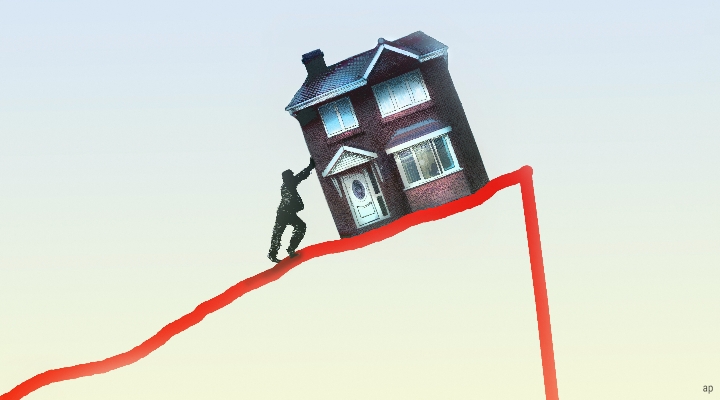
The average price of a house has risen by almost £50,000 in just two years, and prices themselves are up 0.8% in the last month (the 13th consecutive monthly increase).
That might seem like good news for homeowners, but taken with the rest of the data from Nationwide’s latest bulletin published today, it’s obvious why worry is starting to set in.
Though prices are still ostensibly rising, they are doing so at a slower rate. And as households prepare for what could be as much as an 80% increase in energy bills amid general inflationary pressure of more than 10%, onlookers are starting to worry about mortgage defaults and repossessions.
"The crunch point will come when buyers that have bought in the last couple of years have to remortgage," says Bestinvest personal finance analyst Alice Haine.
"With a potential recession looming, the tipping point for the property market will come if people start losing their jobs and cannot keep up with mortgage payments forcing them to sell their homes at a price lower than they’d like in a bid to secure a quick deal.
If you can, now might be a good time to consider remortgaging, or alternatively paying off more of your mortgage than you normally would. If, that is, you can afford it.
"With the average two-year fixed deal hitting 4.2% this week, now is the time to lock in a new deal while it is still relatively affordable – particularly as some lenders allow you to fix a rate up to six months before it expires," Haine says.
"The financial markets are expecting interest rates to more than double by next May to 4%, so the situation could be very different in just a few months' time. If your deal does not expire until next year, one strategy might be to overpay on your mortgage now, if you can afford to, to help reduce the financial hit when the product comes to an end."
Other analysts are much more sceptical, however, and forecast a significant drop in prices as property market activity slows.
In a post entitled This is Getting Scary, Neil Hudson, an analyst and property expert at residential property research firm Built Place, notes the cost of living crisis may provide the necessary ingredients of a housing crash.
"We expect the impact of higher mortgage rates and the rising cost of living to be seen first in lower activity levels," he says.
"However, the scale of the crisis and the absence of any significant government support makes a large fall in house prices increasingly likely. As prospective buyers start to struggle to borrow enough to meet the high price expectations of sellers, activity levels will fall (we are intrigued to know how lenders are adjusting their affordability tests to account for the cost of living crisis).
"This situation will lead to a stagnating housing market. While not immediately disastrous [...] it would contribute to a weaker economy through all the various business directly and indirectly associated with housing transactions.
"For it to turn into a crash would require a large number of forced sellers. Unfortunately, the cost of living crisis increasingly looks like it may lead to that. And house prices are already looking over-valued (by 14% in July). But ever-higher mortgage-based buyers can afford. For example, based on our simple model a mortgage of 4% suggests prices would be nearly 40% over-valued. This would require a 28% price fall to get average UK house prices back to an affordable level."





























